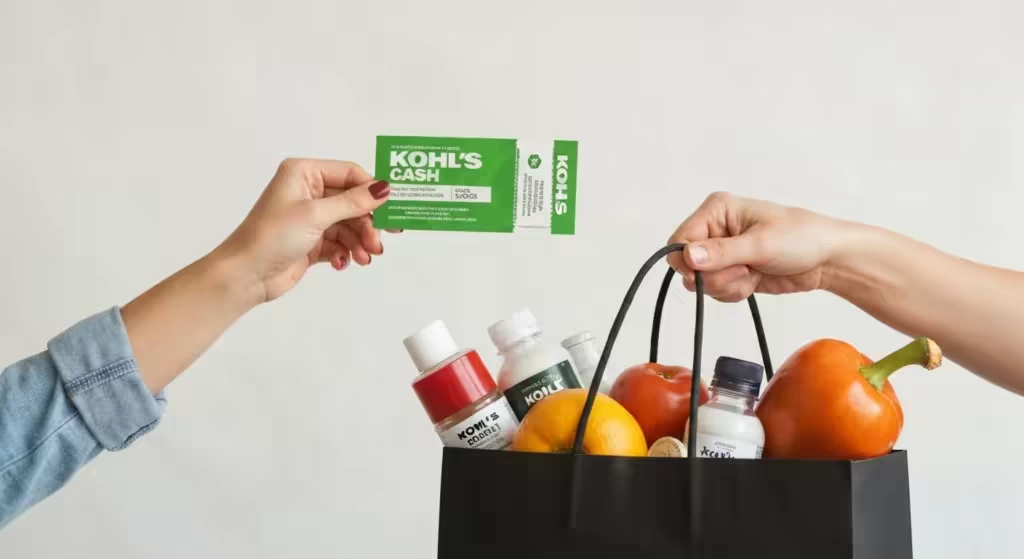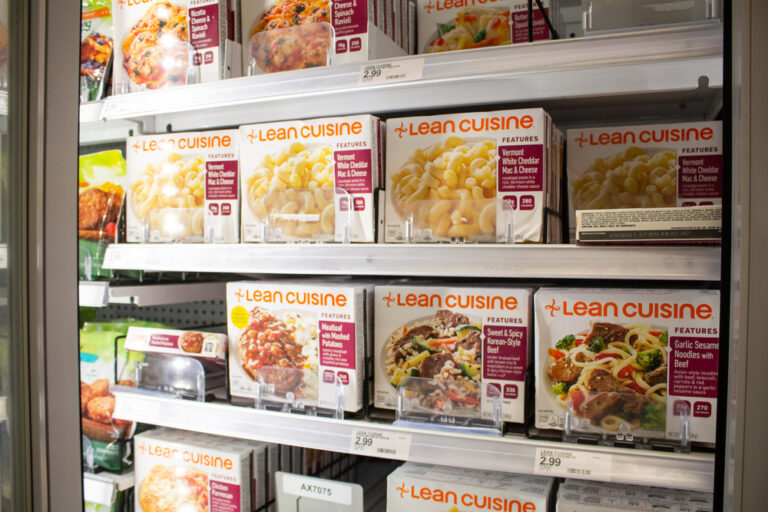These disappearing grocery items won’t be on the shelves much longer!
Have you noticed that some of your favorite items that once graced the shelves of supermarkets are no longer there? It’s a frustrating experience: you walk down an aisle, eyes scanning for that familiar box or bottle, only to find an empty space or, even worse, a completely different product in its place. If you have, I’m here to tell you that you’re not imagining things. The grocery landscape is constantly shifting, and many products have a much shorter lifespan than we realize. And there’s a reason behind every one of their disappearances, from shifting consumer tastes and supply chain nightmares to simple cases of a product just not selling well enough.
After being deemed unpopular, dangerous, or just plain inappropriate, certain things have been getting the proverbial boot, and you’ll likely never see most of them in grocery stores again. Companies are always evaluating their product lines, and if an item isn’t performing, it gets cut to make way for something new. It’s a ruthless business. Here’s another thing I noticed, a secret little tip for the savvy shopper: If you see an asterisk on the price label for an item, buy it if you love it! Don’t hesitate or think you’ll grab it next week.
The asterisk, often called the “death star” by retail employees, means that it’s being discontinued at that store and might never return to those specific shelves. The store is clearing out its remaining inventory and won’t be ordering any more. Other items, though, could simply disappear from shelves abruptly without any warning at all, victims of a sudden corporate decision or a supply chain breakdown. So before this happens, take a look at this list of 10 disappearing grocery items, and if your faves are on here, be sure to stock up before it’s too late!
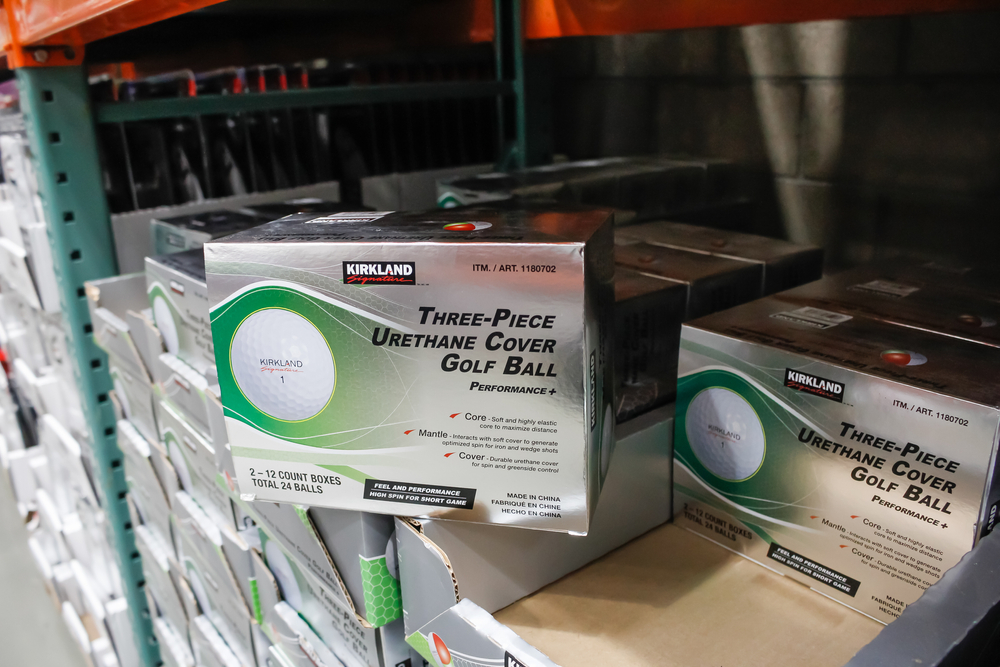
Kirkland Signature Performance One golf balls
Sometimes, it’s best not to mess with a classic, a lesson Costco learned the hard way. Many golfers went nuts over the original Kirkland Signature golf balls at Costco. Known for their incredible performance that rivaled premium brands like Titleist’s Pro V1 at a fraction of the price, these balls developed a cult-like following. And they usually sold out fast whenever they were in stock, with golfers eagerly awaiting each restock. But they weren’t quite up to snuff when the company tried to update the ball, including a new name: the Signature Performance One.
This updated version failed to live up to the legacy of its predecessor, with players reporting issues with durability and inconsistent performance. The backlash was swift. So Costco, in a move to protect its brand’s reputation for quality, chose to refund the purchase price for everyone who bought this disappearing grocery item, with a message saying, “Some of the balls don’t meet the high standards that are expected for the Kirkland Signature brand.” It was a costly mistake, but one that reinforced customer trust in the Kirkland name.
E-cigarettes
Vaping was originally praised as a means to help people quit smoking cigarettes, marketed as a cleaner, safer alternative. The industry exploded with countless brands and flavors, and vape shops became a common sight. But, with increasing concerns about the dangers of vaping, especially among young people, many stores are cutting back on selling e-cigarettes and their cartridges. The tide has turned dramatically against these products.
Walmart, for instance, a massive player in American retail, announced that it was suspending all sales of this disappearing grocery item once its current stock was sold. This was a huge blow to the industry. The decision came after they had already dedicated themselves to raising the age for buying vaping products and e-cigarettes to 21 and stopped selling the fruit and dessert flavored liquids that clearly appealed to minors and drew the ire of parents and health officials. With the long-term health effects still largely unknown, many major retailers are deciding it’s just not worth the risk.
Rainbow Matchstix carrots
Before that dreaded pandemic turned the world upside down, Bolthouse Farms offered over a dozen varieties of baby carrots, providing a colorful and healthy snack option for families. Now that’s down to four options, the company’s CEO stated to media outlets. The pandemic forced many companies to streamline their operations, focusing only on their most popular, highest-volume products to keep shelves stocked amidst supply chain chaos.
The company has stopped making this disappearing grocery item, the beloved rainbow-hued shredded carrots, and offers French-cut carrots in an assortment of red, purple, and yellow hues instead. It’s a similar concept, but not quite the same for fans of the original texture and cut. However, you can still buy orange Matchstix carrots, and the classic baby carrot options remain plentiful. It’s a small but noticeable casualty of the massive production shifts that occurred over the last few years.
Self-serve stations
I think it’s safe to say that you’ll have to say goodbye, probably forever, to salad bars, hot food bars, olive, and pickle bars, and any other in-store bar where consumers can serve themselves. For a long time, these were a lunch-hour staple for office workers and a convenient way to grab a quick, customized meal. It seems as though these disappearing grocery items were already seeing a decline in sales before the pandemic anyway, as hygiene concerns started to grow.
Let’s be honest, the cleanliness of those stations was always a bit questionable. And salad bar tongs were never cleaned properly. Now, in the age of post-COVID-19, we understand that sneeze guards aren’t all that sufficient to prevent the transmission of virus particles from infected shoppers to utensils and open food containers. The very concept of dozens of people sharing the same serving spoons and breathing over open food now seems unthinkable. So, self-serve stations are becoming extinct more and more everywhere, a relic of a bygone era.
According to news outlets, some grocery chains are trying to acclimate to this new reality rather than abandon the concept entirely. For example, at Publix, employees now stand behind the bar and scoop out selected items for customers, creating a deli-style experience. Meanwhile, some H.E.B. stores in Texas have stocked their chilled bars to hold prepackaged meals from local restaurants, a clever pivot that supports other local businesses while still offering convenient meal solutions.
Odwalla
In a move that shocked many longtime fans, Coca-Cola declared it was discontinuing Odwalla, its line of protein drinks, smoothies, and premium juices that had been a health-food store staple since the 1980s. The company says the decision resulted from “consumers changing what they want so rapidly” and this disappearing grocery item’s “enduring ongoing financial challenges.” The market had become saturated with competitors offering lower-sugar, cold-pressed, and more specialized options.
But the truth is that supply chain issues probably led to this decision just as much. The logistics of keeping these products fresh are incredibly complex. Refrigerated distribution, known as the “cold chain,” is much more costly than non-refrigerated distribution, requiring special trucks and storage facilities to prevent spoilage. Coca-Cola’s massive global supply chain is primarily built for non-refrigerated, shelf-stable products like soda. Maintaining the separate, expensive cold chain for the underperforming Odwalla brand simply no longer made financial sense.
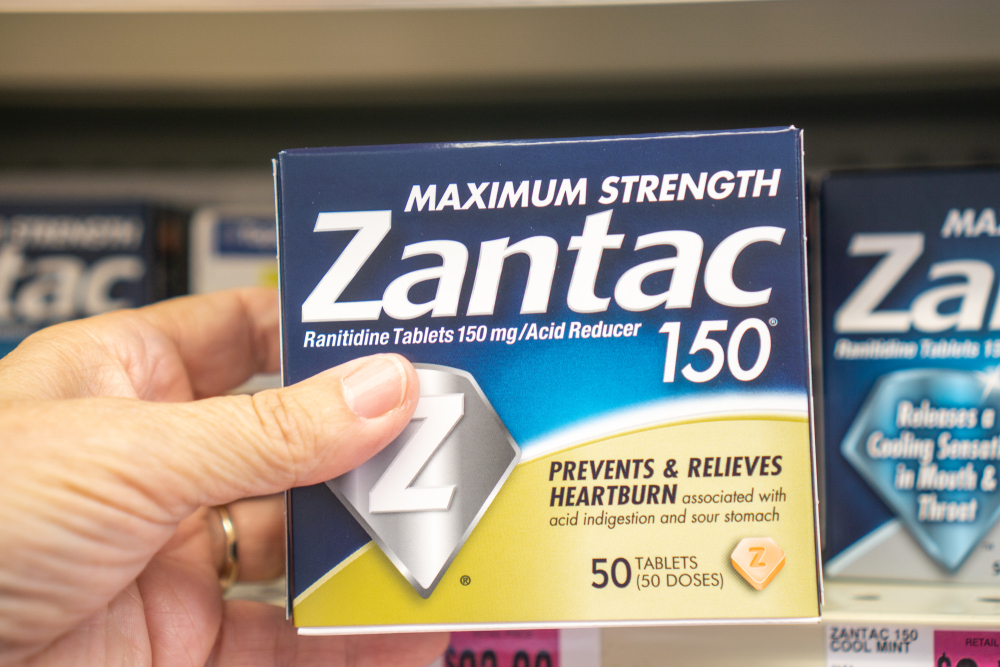
Zantac
In a major public health scare, Walmart was among several merchants—including Walgreens, CVS Health, and Rite Aid—that pulled the popular heartburn drug Zantac from its shelves. The recall wasn’t just for the brand name, but for anything else with its active ingredient: ranitidine. The U.S. Food and Drug Administration (FDA) requested the immediate removal after regulators found harmful contaminants in the medication last year.
The discovery of low levels of a chemical called N-nitrosodimethylamine (NDMA), a probable cancer-causing chemical, in this disappearing grocery item sent shockwaves through the pharmaceutical industry and worried millions who relied on the drug for relief from acid reflux. This same contaminant also resulted in recalls of a few prescription blood pressure medications the previous year, highlighting a wider issue in drug manufacturing. The product has since been reformulated with a different active ingredient, famotidine, but the Zantac brand name is forever tarnished by the recall.
Smucker’s Uncrustables
Don’t freak out yet, guys! This one isn’t a total disappearance, so you can breathe a sigh of relief. They’re not all leaving your local supermarket’s shelves, as the classic versions are safe. But J.M. Smucker Co. is halting production, at least for now, of some of its reduced-sugar and reduced-fat frozen PB&J sandwiches, according to the company. These “healthier” alternatives are getting the axe.
So what’s going on? Well, recent trends show many people are munching on snacks more, eating lots more comfort food and more sugar-full foods. The stress and changes in routine over the past few years led many to seek out familiar, indulgent treats. Research shows that reducing our intake of sugar and fat doesn’t seem to be a high priority right now for Americans, who are prioritizing comfort and convenience over dietary concerns. Demand for the full-flavor classics skyrocketed, while the reduced-sugar versions sat in the freezer.
Now, it’s too soon to tell if that’s a dietary change that will stick around for the long haul or just a temporary phase. Smucker’s has indicated that the move might not be permanent, leaving the door open for a return if consumer habits swing back toward healthier options. But for now, you might want to stock up on this disappearing grocery item if you love the lower-sugar version, because you won’t find it for the foreseeable future.
Specialty meats
Have you noticed that the selection of cuts available in the meat case has declined recently? You’re not imagining it. Finding specific items like boneless, skinless chicken thighs, flat iron steaks, or pre-marinated kabobs has become more difficult. Well, that’s partly due to coronavirus outbreaks in meatpacking plants. These facilities became hotspots, forcing them to close plants temporarily or reopen with skeleton crews to allow for social distancing.
This created a massive bottleneck in the supply chain. With fewer workers, plants had to concentrate on producing more basic products, like bone-in cuts or simple ground meat, which are less labor-intensive and can be processed more quickly to meet basic demand. Besides this, big orders from schools and restaurants are down substantially, and it’s no surprise that meat suppliers have had to adapt their entire production model. The end result? The production of this disappearing grocery item in the past few years has been down by 25% from before the pandemic, leaving consumers with fewer choices.
Half-sheet cakes
In a move that sparked outrage from party planners everywhere, Costco has officially announced that it will no longer be selling its iconic half-sheet cakes. These tasty and incredibly affordable rectangular cakes have been a staple of birthday and graduation parties for years, capable of serving nearly 50 people for under $20. But not anymore. Costco has been phasing the cakes out over the past few months, promoting their new ten-inch round cakes instead.
Their reaction to disappointed shoppers has been somewhat cryptic and corporate-sounding. They’ve said that they’ve “reduced service in some departments” and that their round cakes “seem to be resonating” with membership owners. Could it perhaps be because the round cakes serve far less people? A 10-inch round cake typically serves 12-16 people, a far cry from the 48 servings of the sheet cake, and at a similar price point, making it a much more profitable item for the warehouse.
Many speculate that this warehouse club is trying to discourage large social gatherings, a decision made during the height of the pandemic that they’ve simply decided to stick with. Whatever the case, say goodbye to this disappearing grocery item. It’s a true end of an era for budget-friendly celebrations, at least for now.
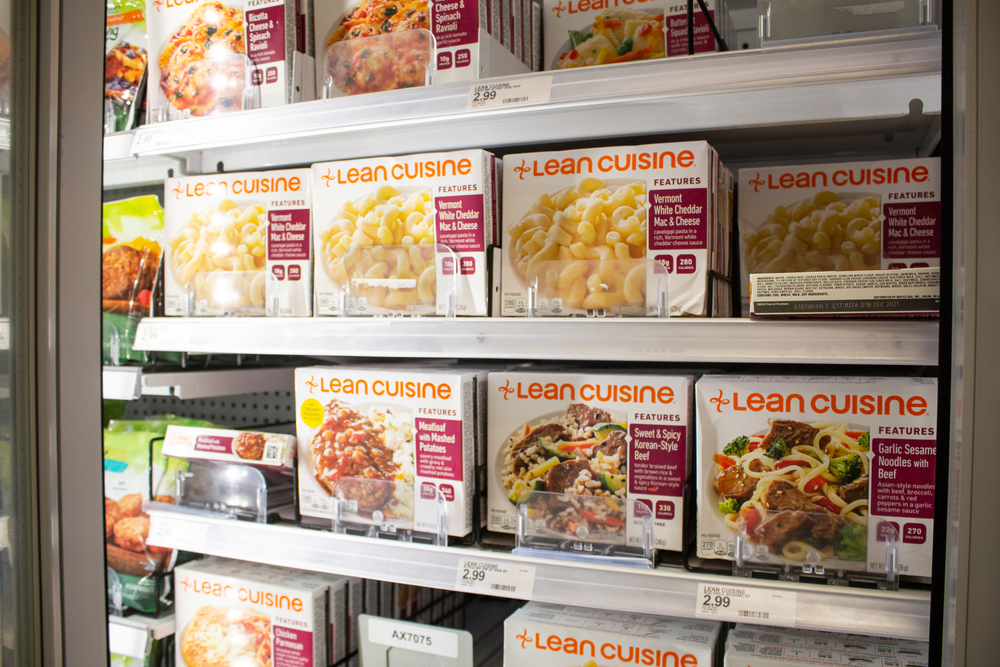
Lean Cuisine Chicken Carbonara
Nestle declared that it was discontinuing a few varieties of Lean Cuisine, the brand that has long been synonymous with convenient, low-calorie frozen meals. The company stated that their sales didn’t warrant the slowdown in production they generated. In a high-volume factory, complex recipes can create bottlenecks, and if a product isn’t a top seller, it’s often the first to go. If you’re a big fan of Chicken Carbonara, with chicken, fettuccine, bacon, asparagus, and a creamy sauce, you may want to learn to make it yourself at home because it’s one of the disappearing grocery items.
Even though chicken is desirable at the moment, explaining its price point and health qualities make it a favorite, the carbonara sauce in this dish is the opposite of healthy. This creates a bit of a brand identity crisis. A rich, creamy, bacon-filled sauce, even a “lean” version, might struggle to find its audience. Hardcore dieters might avoid it, while those seeking indulgence would likely opt for a more authentic, full-fat version. This could explain why sales have been down and why Nestle decided to focus on other meals that better align with the brand’s core message.
Did you know about all these? It’s always a shock when a product you’ve been buying for years suddenly vanishes. Are any of these disappearing grocery items regularly on your shopping list? Is there another discontinued product you’re still mourning? Let me know how you feel about all this in the comments section below.
But don’t leave yet! While this list covers items you can no longer buy, it’s also smart to know which items you *can* buy but probably *shouldn’t*. If you found this article helpful, you’ll also want to read about the 16 Extremely Overpriced Foods That Don’t Deserve a Spot on Your Grocery List





